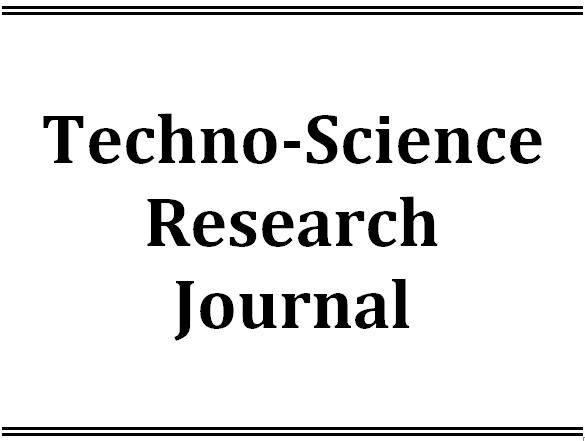Latest Issue
The Negative Experiences of Low-Income Citizen Commute and Their Intentions Toward Public Bus in Phnom Penh
Published: December 31,2025Reliability Study on the Placement of Electric Vehicle Charging Stations in the Distribution Network of Cambodia
Published: December 31,2025Planning For Medium Voltage Distribution Systems Considering Economic And Reliability Aspects
Published: December 31,2025Security Management of Reputation Records in the Self-Sovereign Identity Network for the Trust Enhancement
Published: December 31,2025Effect of Enzyme on Physicochemical and Sensory Characteristics of Black Soy Sauce
Published: December 31,2025Activated Carbon Derived from Cassava Peels (Manihot esculenta) for the Removal of Diclofenac
Published: December 31,2025Impact of Smoking Materials on Smoked Fish Quality and Polycyclic Aromatic Hydrocarbon Contamination
Published: December 31,2025Estimation of rainfall and flooding with remotely-sensed spectral indices in the Mekong Delta region
Published: December 31,2025Preliminary Study on Physicochemical Quality and Antibiotic-Resistant E. coli and Aeromonas spp. in Aquaculture of Pangasius in Kampong Thom Province
-
1. Faculty of Chemical and Food Engineering, Institute of Technology of Cambodia, Russian Federation Blvd., P.O. Box 86, Phnom Penh, Cambodia
Received: September 06,2022 / Revised: / Accepted: October 28,2022 / Available online: June 30,2023
Aquaculture plays an important part in Cambodia's food security and livelihoods. As the population grows, aquaculture is becoming economically important as a means of improving local fish yield for food security. Antimicrobial usage (AMU) in agricultural sector is a key driver of antimicrobial resistance and can be harmful for human health. Misuse and overuse of the antibiotic products are the two factors that contributing to the rise in antibiotic resistance (ABR). This study aims to investigate the prevalence of the antibiotic-resistant bacteria (E. coli and Aeromonas spp.) in aquaculture of Pangasius in Kampong Thom province and to evaluate the physicochemical properties of the water environment of the aquaculture. The samples (fish, water, and sediment) were collected from aquaculture at Phat Sanday village in Kampong Thom province. The physicochemical parameters of water were measured onsite including temperature, pH, dissolve oxygen (DO), oxidation reduction potential (ORP), electrical conductivity (EC), and total dissolve solid (TDS). Aeromonas spp. and E. coli were determined on the sample from fish and sediment by using spread plate techniques, whereas the filtration technique was applied on the water samples. The isolation of both bacteria was conducted and the antimicrobial susceptibility testing was performed by using eight antibiotics from difference classes. The physicochemical properties of cultured water shown that temperature was in range of 27.43 to 30.09 oC, pH was between 7.04 to 7.68, D.O was between 2.1 to 6.29 mg/L, ORP was between 65.7 to 168.9 mV, EC was between 462 to 1186 μs/cm, and TSD was between 177 to 593 mg/L. A total of 272 strains such as 60% of presumptive E. coli and 40% of presumptive Aeromonas spp. were isolated from fish, water, and sediment. Most of strains (E. coli and Aeromonas spp.) had high resistance to Ampicillin and Ciprofloxacin. This is the preliminary study on the status of antimicrobial resistance in culture environment of Panagasius. This study provides an implication toward the urgent management and control the spread of AMR in the aquaculture practice.

